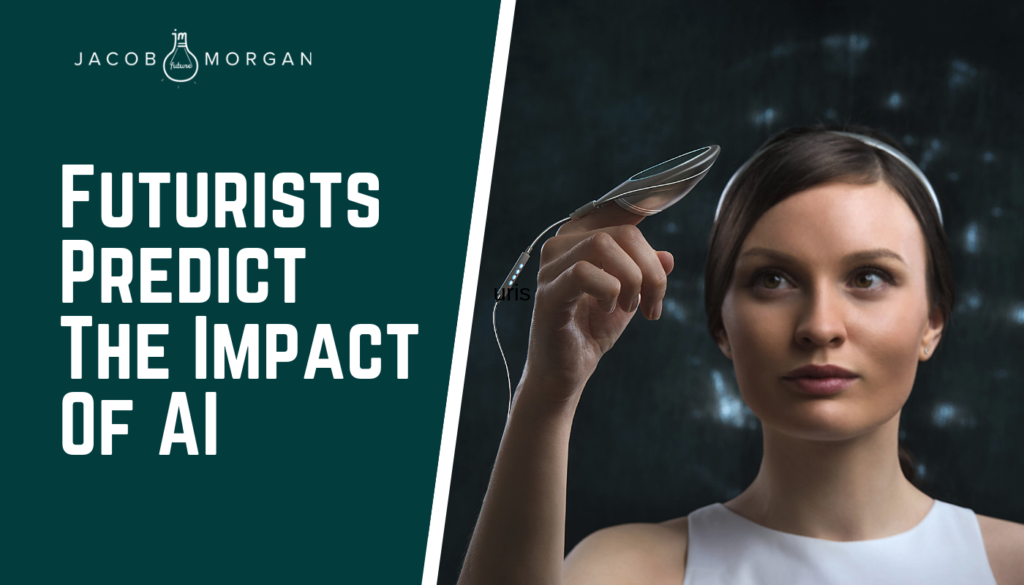
AI is everywhere. Each week I chat with HR leaders, authors, and futurists on my podcast, The Future of Work Podcast, and artificial intelligence is a frequent topic. It’s on everyone’s minds and will no doubt play a large role in the future of work. Here is what a few of my guests have had to say about the potential of AI and what organizations and individuals can do to prepare for its growth.
Martin Ford, futurist author and entrepreneur, believes AI will have a huge impact on jobs and replace not just the types of jobs that are typically discussed, like transportation and manufacturing, but also more traditional blue collar jobs like lawyers and doctors. Nearly half of all jobs will be impacted by AI, and Martin sees three possible AI-related job scenarios. In the first, there is mass unemployment, which leads to widespread poverty and a collapse of the economy. The second scenario is what we are facing now where the quality of jobs is declining and there is inequality between AI jobs and non-AI jobs. In the third scenario, there is significant growth in jobs as things adapt and learn to work with AI.
In order to be prepared for any of Martin’s potential scenarios, he says executives need to talk openly about what could happen. AI will be a powerful disruption that requires attention. We can’t ignore it and must get involved in the discussion. In any of these scenarios, the most secure jobs are those in the creative field, so Martin encourages employees who work in repetitive jobs to move towards creative responsibilities.
Author and entrepreneur Dr. Luis Perez-Breva runs the MIT Innovation Teams Program and has done significant research on AI. To him, the best aspiration for AI is a partner like J.A.R.V.I.S. from the movie Iron Man—a computer that helps with problematic reasoning, building parts, and discussing new ideas. Iron Man wouldn’t be who he is without J.A.R.V.I.S. because it is literally built into the suit. The same will be true of AI in the future. It isn’t a threat, but rather an opportunity for a partner who can take our work to the next level. Luis compares it to how we find information today. We used to have to go to a library and spend a lot of time finding information. Now, however, we can simply use Google to quickly find answers. That advancement hasn’t scared people; it has just made us smarter and more productive. Computers are now our partners in finding information, and that will continue to grow with AI.
Create Amazing Employee Experiences In Your Organization
Get started on our FREE training series!
Get Started →
AI is merely the next step in the advancement of our society. No one uses gas street lamps today, and the world is better off because we advanced to light bulbs. As Luis says, every time we develop new technology, we become smarter. He says it is up to us to decide what jobs stay and go and that it is more of a management function than a technology function to decide what jobs are replaced by AI.
Stanford professor Dr. Paul Oyer’s research involves looking at big data analysis. One of his worries is that people will become so reliant on data that they won’t trust their own training or intuition. Paul agrees with other futurists that any job that can be done by a computer is at risk of being replaced by AI, including jobs like transcription and logistics. People who are worried about losing their jobs should get trade training in areas that aren’t as likely to be replaced. Retraining to expand our skills and learn something new is very important, but it can be difficult to do. Employees who are best prepared for the future and who won’t likely find themselves replaced by AI are those who are open to training and understand the need to diversify their skillsets.
AI has the power to transform how we live and work, and as most futurists agree, it is something to be excited about, not something to be scared of. Having open conversations and adapting our skillsets can help us prepare for a future of work that is full of AI.
Get my free training series to create powerful Employee Experiences in your organization.
